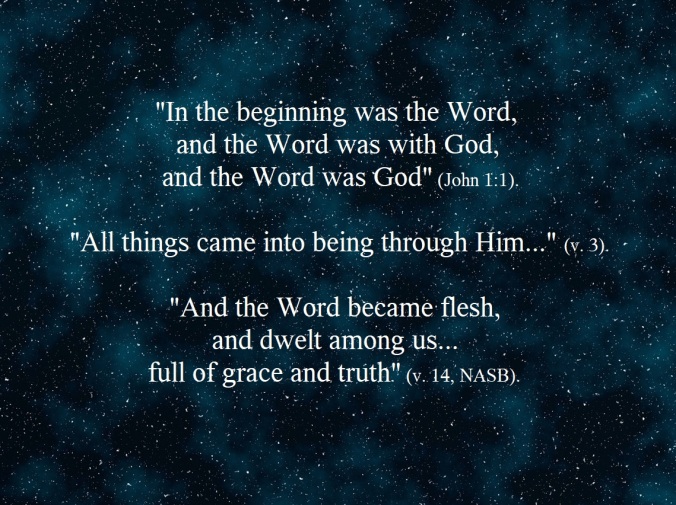“Go therefore and make disciples of all the nations…teaching them to observe all that I commanded you; and lo, I am with you always, even to the end of the age” (Matthew 28:19-20, NASB).
——————–
Contents:
1) Miracles of Jesus (Tom Edwards)
——————–

-1-
Miracles of Jesus
Tom Edwards
The miracles of Christ served to confirm what He taught and who He was (and is). When some Jews had asked Him, “If you are the Christ, tell us plainly” (Jn. 10:24), the Lord responded by saying, “I told you, and you do not believe; the works that I do in My Father’s name, these testify of Me” (Jn. 10:25). He then went on to say, “If I do not do the works of My Father, do not believe Me; but if I do them, though you do not believe Me, believe the works, so that you may know and understand that the Father is in Me, and I in the Father” (John 10:37-38). In John 5:36, Jesus declares, “But the testimony which I have is greater than the testimony of John; for the works which the Father has given Me to accomplish – the very works that I do – testify about Me, that the Father has sent Me.” Compare also John 10:25.
When John, while in prison, sent word to Jesus, asking, “Are You the Expected One, or shall we look for someone else?” (Matt. 11:3), Jesus answered, “Go and report to John what you hear and see: the BLIND RECEIVE SIGHT and the lame walk, the lepers are cleansed and the deaf hear, the dead are raised up, and the POOR HAVE THE GOSPEL PREACHED TO THEM” (vv. 4-5).
The Bible records some of the miracles Jesus performed while on earth. John says about them: “Therefore many other signs Jesus also performed in the presence of the disciples, which are not written in this book; but these have been written so that you may believe that Jesus is the Christ, the Son of God; and that believing you may have life in His name” (Jn. 20:30-31).
John then closes his account in John 21:25 with the following words: “And there are also many other things which Jesus did, which if they were written in detail, I suppose that even the world itself would not contain the books that would be written.” This makes me often think of Jesus as being the great Creator (cf. Jn. 1:1-3), and wondering how many volumes of books it would take to just mention each individual star and other heavenly bodies that He has made. For God “counts the number of the stars; He gives names to all of them” (Psa. 147:4).
The following is a list of some of the miracles that Christ performed while on earth:
1. He not only turned water into wine, but also into the best wine (Jn. 2:1-11). For He has the power to bring about change and produce quality. Through Him, the sinner can become a saint, the child of the devil can become a child of God, and those in the domain of darkness can be transferred into the kingdom of God’s dear Son by simply meeting His conditions. For when cooperating with God in this way, He is then able to “work in you, both to will and to work for His good pleasure” (Phil. 2:13). And Jesus made all that possible.
2. While in Cana of Galilee, Jesus healed a nobleman’s son who was about 16 miles away in Capernaum (John 4:46-54). For Jesus is not limited nor hindered by distance — not even by the endless realm of infinity! As the psalmist writes:
“Where can I go from Your Spirit?
Or where can I flee from Your presence?
If I ascend to heaven, You are there;
If I make by bed in Sheol, behold, You are there.
If I take the wings of the dawn,
If I dwell in the remotest part of the sea,
Even there your hand will lead me,
And Your right hand will lay hold of me.
If I say, ‘Surely the darkness will overwhelm me,
And the light around me will be night,’
Even the darkness is not dark to You,
And the night is as bright as the day.
Darkness and light are alike to You” (Psa. 139:7-12).
3. The Lord healed a lame man at the pool of Bethesda who had been ill for 38 years (John 5:1-9). For Jesus, who is from Eternity (cf. Micah 5:2 and Jn. 8:58), is also the One who brought our linear time into existence (cf. Gen. 1:14-19). Jesus dwelt in eternity before there was time as we know it. So time has no bearing on who He truly is. For He “is the same yesterday and today and forever” (Heb. 13:8). And whatever effect time might have in making matters worse, it makes it no more difficult for Christ to resolve the problem — whether one had been sick for one day or thirty-eight years, etc. As Peter writes, “…with the Lord one day is like a thousand years, and a thousand years like one day” (2 Pet. 3:8).
4. In the first miraculous catch of fish, it was so abundant that the nets began to break; and the catch filled two boats to the extent that it caused them to begin to sink (Luke 5:1-11). For Jesus also has the power to bring forth in great quantity. This has truly been demonstrated in the innumerable, heavenly objects of His creation that go even beyond what astronomers have been able to fully discover (cf. Jn. 1:3). His multiplying the few loaves of bread and a few fish to feed the great multitudes of “four thousand men, besides women and children” (Mark 15:38) and, on another occasion, “about five thousand men…besides women and children” (Matt. 14:21) show that He is not limited by the amount. For He has the power to not only give increase, but also to even bring into existence — out of nothing — that which had not existed before. And, according to Genesis 1:3, the Lord can do this by simply speaking what He wills into existence. For He said, “..’Let there be light’; and there was light” (Gen. 1:3). After saying that “the worlds were prepared by the word of God,” the Hebrew writer then goes on to declare, “so that what is seen was not made out of things which are visible” (Heb. 11:3). And in the case of the miraculous catch of the fish, could it be that the Lord had commanded such a large number to go to those nets, just as God had brought the creatures to Noah that were to enter the ark? For after mentioning “every beast after its kind, and all the cattle after their kind, and every creeping thing that creeps on the earth after its kind, and every bird after its kind, all sorts of birds,” it then goes on to say, “so they went into the ark to Noah, by twos of all flesh in which was the breath of life” (Gen. 7:14-15). “Those that entered, male and female of all flesh, entered as God had commanded him; and the LORD closed it behind him” (v. 16). So these creature “went into the ark to Noah.” And Jesus could have caused this with the disciples’ catch of fish or He could have simply multiplied them as He did the few loaves of bread and few fish; but either way, it was a miraculous event — especially after catching nothing all night!
5. Casting out the unclean spirit (demon) (Mark 1:23-28; Luke 4:31-36). By casting out demons, Jesus also showed that His power is superior to theirs. And, yes, His power is infinitely greater than that of Satan and all the evil forces combined!
6. Healing Peter’s mother-in-law (Mat. 8:14-17; Mark 1:29-31; Luke 4:38-39). Healing of sickness was no problem for the Lord — regardless of whatever the illness or infirmity. Unlike the many so-called faith-healers today, not once did Jesus ever fail in making anyone well again. Matthew records that “Jesus was going throughout all Galilee, teaching in their synagogues and proclaiming the gospel of the kingdom, and healing every kind of disease and every kind of sickness among the people. The news about Him spread throughout all Syria; and they brought to Him all who were ill, those suffering with various diseases and pains, and demoniacs, epileptics, paralytics; and He healed them” (Matt. 4:23-24).
7. Cleansing a leper (Matt. 8:2-4; Mark 1:40-45; Luke 5:12-16). What a lonely life it must have been for many a leper who had to live apart from the rest of society, as an outcast; but Jesus reached out to these as well. In Mark’s account, the Lord was not only willing to heal the leper, but was also “Moved with compassion” to do so (Mk. 1:41).
8. Healing a paralytic (Matt. 9:2-8; Mark 2:3-15; Luke 5:18-26). It was by this miracle that Jesus also showed He had the power on earth to forgive sins.
9. Healing a man with a withered hand (Matt. 12:9-14; Mark 3:1-5; Luke 6:6-11). Because Jesus did this on the Sabbath, some found fault with Him. But the Lord pointed out their own inconsistency. For they would help a sheep that had fallen into a pit on the Sabbath. And Jesus said, “How much more valuable then is a man than a sheep!” (Matt. 12:12). How did the Pharisees react to this? They then “went out and conspired against Him, as to how they might destroy Him” (v. 14).
10. Healing a centurion’s servant (Matt. 8:5-13; Mark 7:1-10). The centurion knew that just as he had soldiers under his charge who would do whatever he commanded them, the Lord had that same kind of authority even over any illness and infirmity. He could simply will it to be gone — and it would be!
11. Raising a widow’s son from the dead (Luke 7:11-17). Jesus has power over even death, for He is “the resurrection and the life” (Jn. 11:25). And He proved that by miraculously raising various people who had been deceased.
12. Healing a blind and dumb demoniac (Matt. 12:22; Luke 11:14). This man had also been demon possessed, and the Lord’s casting out of that demon is seen in connection with the healing. Of course when some of the Pharisees heard of this, who sought to turn people against the Lord, they falsely said, “This man cast out demons only by Beelzebul the ruler of the demons” (Matt. 12:24).
13. Stilling a storm (Matt. 8:18, 23-27; Mark 4:35-41; Luke 8:22-25). Here, Christ demonstrated His power over the elements of nature. For after all, it, too, was part of His creation.
14. Delivering the Gadarene demoniacs (Matt. 8:28-34; Mark 5:1-20; Luke 8:26-39). Two men had become so “extremely violent” by being demon-possessed that people would have to avoid them. But Jesus went to them and cast the demons out, thus freeing those men. Luke’s account focuses on just one of them and points out that he had been possessed by “many demons” that went by the name “Legion.” This man had lived unclothed for a long time, in the tombs. There had been occasions when he “was bound with chains and shackles and kept under guard, and yet he would break his bonds and be driven by the demon into the desert” (Luke 8:29). But thanks now to Jesus, this man was set free! The demons were gone, and the man was now clothed and in his right mind and greatly desiring to accompany the Lord. But Jesus told him to “Return to your house and describe what great things God has done for you” — and the man proclaimed that throughout the entire city (Luke 8:39).
15. Healing a woman with an issue of blood (Matt. 9:20-22; Mark 5:25-35; Luke 8:41-42). This woman had suffered from a hemorrhage for twelve years. She had been to many doctors and spent all that she had, but none of them could make her well again. With faith in Jesus, she believed that just touching His garment would heal her. So she did so. “Immediately the flow of her blood was dried up; and she felt in her body that she was healed of her affliction” (Mk. 5:29). And when that was happening, Jesus was “perceiving in Himself that the power proceeding from Him had gone forth…” (v. 30) — a divine power that heals and makes well.
16. Raising Jairus’ daughter from the dead (Matt. 9:18-19, 23-26; Mark 5:22-24, 35-43; Luke 8:41-42, 49-56). This was the daughter of a synagogue official who believed that the Lord could bring her back to life by merely laying His hand on her. After the Lord took this deceased girl by the hand, she then arose — very much alive! (Matt. 9:25).
17. Healing two blind men (Matt. 9:27-31). These men, who believed that Jesus could give them eyesight, had asked Jesus to have mercy on them. “Then He touched their eyes, saying, ‘It shall be done to you according to your faith” (v. 29) — and it was so! (v. 30).
18. Delivering a dumb demoniac (Matt. 9:32-33). Demon-possession appears to have been experienced by many during the time Jesus was on earth. Would this not be in order that Christ could demonstrate His superiority over them — which He did?
19. Feeding the 5,000 (Matt. 14:14-21; Mark 6:35-44; Luke 9:12-17; John 6:4-13). In seeing this miracle, the people said, “This is truly the Prophet who is to come into the world” (Jn. 6:14) — and they wanted to “take Him by force to make Him king” (v. 15). For, sad to say, their concern was on the physical rather than the spiritual. For later, when they sought Jesus, He said to them, “Truly, truly, I say to you, you seek Me, not because you saw signs, but because you ate of the loaves and were filled” (Jn. 6:26).
20. Walking on the water (Matt. 14:24-33; Mark 6:45-52; John 6:16-21). Again, we see Jesus having power over the laws of nature — and now, specifically, the law of gravity. For He is the One who also made that law.
21. Delivering a Syrophoenician’s daughter who had been demon-possessed (Matt. 15:21-28; Mark 7:24-30). The mother of this daughter was a Canaanite and very humble. For after the Lord had told her that He was sent “only to the lost sheep of the house of Israel” and that “It is not good to take the children’s bread and throw it to the dogs,” this woman, who had bowed down before Him, replied, “Yes, Lord; but even the dogs feed on the crumbs which fall from their masters’ table” (Matt. 15:24-27). The Lord then commended her for her great faith, and He healed her daughter.
22. Healing a deaf mute in Decapolis (Mark 7:31-37). In this case, the Lord performed the healing by putting His fingers into the deaf man’s ears, “and after spitting, He touched his tongue with the saliva; and looking up to heaven with a deep sigh, He said, to him, ‘Ephphatha!” that is, ‘Be opened!’ And his ears were opened, and the impediment of his tongue was removed, and he began speaking plainly” (vv. 33-35).
23. Feeding the 4,000 by multiplying the seven loaves of bread and a few small fish (Matt. 15:32-39; Mark 8:1-9). It was the Lord’s compassion for these people that led to the feeding of them. For some had even come a great distance; and it was now three days they had been with Him and without anything to eat.
24. Healing a blind man at Bethsaida (Mark 8:22-26). Here again we see another unusual way the Lord performed a healing. He spat on the blind man’s eyes and laid His hands on him. Immediately, the man saw men, but they appeared to him “like trees, walking around” (v. 24). The Lord then laid His hands on the man’s eyes, and he then could see “everything clearly” (v. 25). This is the only case in which it appears that a healing was done in two-stages. But could it be that after the first time, the Lord’s spittle could have been causing the blur and distorted images, which was then cleared after the Lord touched the man’s eyes?
25. Delivering a demon-possessed boy (Matt. 17:14-18; Mark 9:14-29; Luke 9:38-43). In reading the different accounts, this boy is described as having been a “lunatic” and “very ill” (Matt. 17:15) and had an “unclean spirit” (“demon”) (Luke 9:42) that caused the boy to go into convulsions, foam at the mouth, be mute, be slammed to the ground, and become rigid. This demon had also “often thrown him both into the fire and into the water to destroy hm” (Mark 9:22). When Jesus told the father that “All things are possible to him who believes,” the father responded, by saying, “I do believe; help my unbelief” (Mark 9:23-24). Jesus then commanded the deaf, mute spirit to come out of the son and never enter him again (v. 25).
26. Finding the tribute money in the first caught fish’s mouth (Matt. 17:24-27). Jesus had instructed Peter to “..go to the sea and throw in a hook, and take the first fish that comes up; and when you open its mouth, you will find a shekel…” (v. 27).
27. Healing a man born blind (John 9:1-7). This man was healed though he did not even believe, at the time, in the sinlessness of Christ. For the now healed man said about Jesus, “Whether He is a sinner, I do not know; one thing I do know, that though I was blind, now I see” (v. 25). Coming to him later, Jesus asked, “Do you believe in the Son of Man?” And the former blind man said, “Who is He, Lord, that I may believe in Him?” Jesus said, “You have both seen Him, and He is the one who is talking to you.” The man then said, “Lord, I believe” and worshiped Him (vv. 35-38).
28. Healing a woman on the Sabbath who had been crippled for 18 years (Luke 13:10-17). The account shows that the woman’s infirmity had been caused by a spirit (v. 11). While she glorified God for her healing, the synagogue official found fault with Jesus for doing this on the Sabbath day and told the people that “There are six days in which work should be done; so come during them and get healed, not on the Sabbath day” (v. 14). Jesus then said the following which humiliated his opponents: “You hypocrites, does not each of you on the Sabbath untie his ox or his donkey from the stall and lead him away to water him? And this woman, a daughter of Abraham as she is, whom Satan has bound for eighteen long years, should she not have been released from this bond on the Sabbath Day?’” (vv. 15-16).
29. Healing a man with dropsy (Luke 14:1- 6). According to MedicineNet.com, dropsy is “An old term for the swelling of soft tissues due to the accumulation of excess water. In years gone by, a person might have been said to have dropsy. Today one would be more descriptive and specify the cause. Thus, the person might have edema due to congestive heart failure.”
30. Raising Lazarus from the dead (John 11:17-44). Lazarus, along with his sisters Mary and Martha, had been a good friend of Jesus. Jesus did not go immediately to heal Lazarus when he was sick, but stayed even two days longer, after hearing the news. For the Lord had said, “This sickness is not to end in death, but for the glory of God, so that the Son of God may be glorified by it” (v. 4). By the time He arrived, Lazarus had been dead for four days. But at the Lord’s command, “Lazarus, come forth!,” it was so! (Jn. 11:43). By that miracle, Jesus also confirmed what He had previously declared about Himself that “I am the resurrection and the life…” (v. 25).
31. Cleansing the ten lepers (Luke 17:11-19). Though all were healed, only one of them had turned back to loudly glorify God, having prostrated himself before Jesus and thanking Him. And that healed and grateful man was a Samaritan.
32. Healing Blind Bartimaeus (Matt. 20:29-34; Mark 10:46-52; Luke 18:35-43). Though some were sternly telling Bartimaeus “to be quiet…he kept crying out all the more, ‘Son of David, have mercy on me!’” (Luke 18:39). Jesus certainly didn’t tell him to be quite; but, rather, asked, “What do you want Me to do for you?” (v. 41). “Lord, I want to regain my sight!,” was his reply. Jesus then said, “Receive your sight; your faith has made you well” (v. 42). That led to not only his glorifying God and following Jesus, but also all the people praising God as well.
33. Cursing the fig tree (Matt. 21:18-19; Mark 11:12-14). Because the fig tree was barren of its fruit, the Lord had cursed it so that it would never bear fruit again. It would seem that the Lord did this to make a lasting impression upon all of the need for the individual to be fruitful, as Jesus also speaks of in John 15:1-8. For it actually was not the season for figs (Mark 11:13), but the thought of a barren fig tree being cursed could serve as a deterrent toward our own unfruitfulness.
34. Restoring Malchus’ ear that had been lopped off by Peter when the Roman soldiers had come to seize Jesus (Luke 22:49-51; John 18:10). Jesus had previously prayed in the Garden of Gethsemane, “Father, if You are willing, remove this cup from Me; yet not My will, but Yours be done” (Luke 22:42). Knowing that the cross was now just hours away and what His Father wanted Him to submit to, Jesus was intent on doing so and did not want His followers to hinder Him from that, as Peter was trying to do. And Jesus, even during this time of His betrayal by Judas and now to be taken into custody by the Roman soldiers, also graciously took the time to work a miracle for Malchus. Of all people to drag off! Here is One performing a miracle before them all, as He also did so many other times during His public ministry. So much good Christ could accomplish for mankind, yet He is now being taken away to what would eventually lead to a most torturous death on a cross. And though He knew this and had been “very distressed and troubled” over it (Mark 14:33), He still took the time to heal this man of his severed ear.
35. Second miraculous catch of fish – 153 of them, and the net was not torn (John 21:1-14). This occurred at the Sea of Galilee, following the Lord’s resurrection, and about 70 miles from where He had been crucified. The apostles had been out in their boats fishing that night — but with no success. As day began to break, Jesus called out from the beach, “Cast the net on the right-hand side of the boat and you will find a catch.” They did so — “and then they were not able to haul it in because of the great number of fish” (v. 6). This was the third time that Jesus had appeared to His disciples, following His resurrection.
Again, these are just some of the miracles that Jesus performed while on earth; but they have been recorded that we might believe in Him, submit to Him, and become a part of the family of God.
To think that with God all things are possible and nothing is too difficult! How wonderful heaven will be — and so much more than we have ever known or could ever imagine! It is a place of perfect love, continual peace, and everlasting bliss. May we each earnestly strive for that heavenly home. For to miss out on that would certainly be our greatest regret!
(All Scripture is from the NASB.)
——————–
The Steps That Lead to Eternal Salvation
1) Hear the gospel, for that is how faith comes (Rom. 10:17; John 20:30,31).
2) Believe in the deity of Christ (John 8:24; John 3:18).
3) Repent of sins (Luke 13:5; Acts 17:30).
4) Confess faith in Christ (Rom. 10:9,10; Acts 8:36-38).
5) Be baptized in water for the remission of sins (Mark 16:16; Acts 2:38; 22:16; Rom. 6:3,4; Gal. 3:26,27; 1 Pet. 3:21).
6) Continue in the faith, living for the Lord; for, if not, salvation can be lost (Heb. 10:36-39; Rev. 2:10; 2 Pet. 2:20-22).
——————–
Tebeau Street
CHURCH OF CHRIST
1402 Tebeau Street, Waycross, GA 31501
Sunday services: 9:00 a.m. (Bible class); 10 a.m. & 5 p.m. (worship)
Wednesday: 7 p.m. (Bible class)
evangelist/editor: Tom Edwards (912) 281-9917
Tom@ThomasTEdwards.com
http://thomastedwards.com/go (Older version of Gospel Observer website without pictures, but back to March 1990)
http://tebeaustreetchurchofchrist.org/
http://ThomasTEdwards.com/audioser.html (audio sermons)













